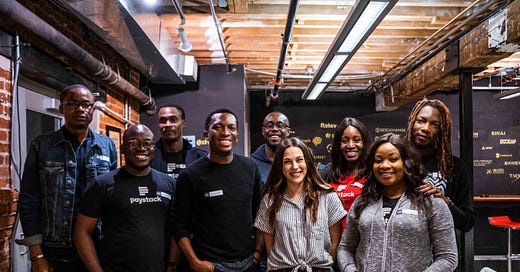This is the first part of my series about product culture.
Join 103 smart, curious folks by subscribing here:
This month we’re learning about Paystack. “Ship fast. Learn faster” is a core product principle at Paystack. The company is now one of the most valuable startups in Nigeria, selling to Stripe for $200 Million last year.
I had the opportunity to speak to my friend Temi Giwa [Temi’s LinkedIn and Twitter]. Temi is one of the more thoughtful product persons I know, She joined Paystack in April 2019 after a fabulous fifteen-year career that spanned UPS, Chevron, Konga, KPMG, WakaNow, where she led engineers, designers and operations in digital execution and acquisition.
Douglas Franklin: What’s your role at Paystack?
Temi Giwa: I am the Product Manager for the Terminal Team at Paystack, the team responsible for all the offline or in-person payment initiatives. That’s everything from Coordinating teams to design & build both mobile and web experiences that delight B2B consumers. I also own product related partnerships including liaising with Government Entities, Financial Institutions and Vendors to ensure product compliance and smooth product operations.
Douglas Franklin: What is Paystack’s product culture like?
Temi Giwa: I consider Paystack in general to be a learning-focused team, but this is hard to say because there is a lot of autonomy for Product Managers and Product Teams. So it's mostly a case of what each product team decides. So there are learn focused teams, build focused teams all around Paystack. We are passionate about creating good products and creating them well. Because of that, we have to learn a lot before we launch instead of just throwing things at the wall and seeing what sticks. When we throw something, it will stick because we know from previous iterations and how we have learnt from our users and customers.
Finally, Paystack is a humble and low-entitlement culture. There’s a high degree of kindness between people. We have a lot of super smart people, but the thing about all of them is that they’re also super kind.
Douglas Franklin: Walk me through a typical new product or feature. How does it start?
Temi Giwa: There are two paths to a product or feature at Paystack. It’s either a bunch of customers asking for a feature or we think of something - that is, somebody within the company has an idea - it could be anyone and they would route it to the relevant product team.
Douglas Franklin: How do you decide to go from internal testing to giving it to external users?
Temi Giwa: As a rule of thumb, we test with a small group of users, when we do that and are quite sure we have gotten rid of all bugs, we then deploy to the general public.
Douglas Franklin: Data Informed or Data Driven?
Temi Giwa: I would say my team is more data informed because there is limited data when you are working with a new product. So we experiment a lot.
Douglas Franklin: You have a legendary product CEO in Shola Akindele. How does Shola engage with a project like this?
Temi Giwa: One of my favorite things about working with Shola is that he’s happy to let PMs do their thing, as long as we’ve earned his trust and he knows that we can make good decisions then we pretty much can run almost independently.
He’s always available to course correct and we check in regularly with him, but we mostly inform Shola on what we are building to ensure it aligns with the objectives for the quarter or year.
Douglas Franklin: What does this all say about the product culture at Paystack? How would you characterize it?
Temi Giwa: We optimize for a high level of autonomy, everyone at Paystack is a manager. It's a culture of high performance and high ownership, and each team has a complete work structure.
Teams may behave a little differently in how they operate on a day to day basis behave differently but have the same objectives and adhere to the same values.
Douglas Franklin: What does Paystack look for in a Product Manager?
Temi Giwa: We look for smart people who can see problems, and can think of creative solutions. We also look for people who know how to use data to make their decisions. I like to get people who have a good product Instinct; People who are not paralyzed by the lack of data.
Douglas Franklin: I’ve often heard Paystack described as “design-led” or “design-oriented.” Tell me about that
Temi Giwa: Paystack cares deeply about the experience our users have while using our product. When Paystack launched, we were targeting people who had never used the internet before, so we had to deliver the best designed product andI don’t mean the prettiest product. It had to be a product that was instinctive to use.
Douglas Franklin: What kind of Product Manager would succeed at Paystack?
Temi Giwa: Anyone with a high sense of autonomy.
If you can’t be a CEO, it's unlikely you would be a Product Manager at Paystack.
Find the article insightful? Please subscribe to receive more learnings about Product Management and I’d appreciate it if you can leave a comment or help spread the word!




Nice,
Nice... I already got 2 things to research loool